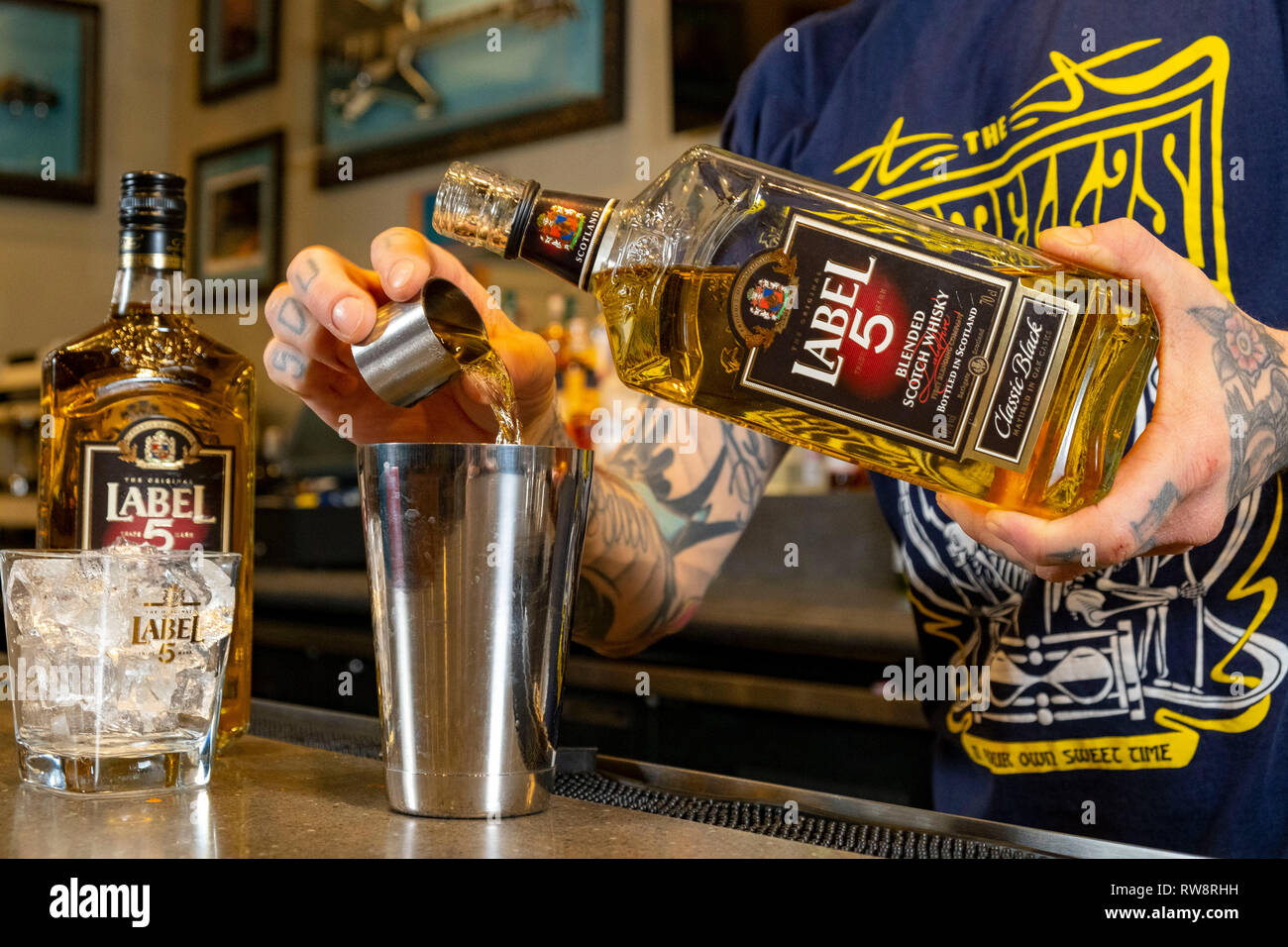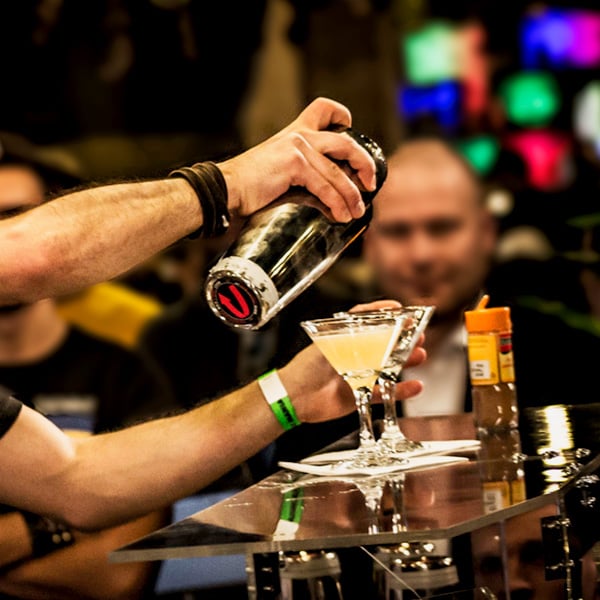SUBSCRIBE.BUY MERCH.FACEBOOK.PODCAST. A bartender is a customer service professional who makes and serves alcoholic and non-alcoholic beverages in bars, restaurants, event venues and other locations. While preparing and serving drinks, bartenders engage in conversation with customers, learn customer drink preferences and monitor customer behavior to prevent excessive drinking. The Bartender will greet customers, learn about their preferences, answer questions, recommend menu items, and prepare and serve beverages and food. You will also upsell items, create recipes, utilize proper equipment and ingredients, and handle basic cleaning duties.
To be best on the job bartenders need to develop the right skills and qualities.
Mar 26, 2014 There are obvious perks to being a bartender: A highly social work environment. The opportunity to be creative. And of course, access to fabulous drinks. But just as with any job, there are downsides. We asked bartenders across the country: What's the worst part of your job? Here's what they had to say.
12 Top Bartender Skills to be best on the Job
Bartenders need to have certain skills to be best on the job. If you are in the bartending career and desire to be effective, this post will help you to learn about the important skills and qualities you need to develop.
Before looking into this, let’s see what bartenders do.
What is the Role of a Bartender?
The job of a bartender is not only to mix and serve drinks to customers, but also to greet and inform them about daily specials and give them menus.
Bartenders take orders from customers and check their identification to ensure they are of legal drinking age.
They clean the bar environment thoroughly, including tables and work areas, and also collect payments from customers, return change, operate cash registers, manage bar operation, and order and maintain liquor and bar supplies. You can see detail bartender job description here.
Now, here are vital bartending skills and qualities you need to have to be highly effective on the job.
12 Best Bartender Skills that give you an Edge
1. Communication
You need to communicate effectively with your customers during your shift, using a positive and clear tone of voice, but making it loud enough without shouting.
For you to be able to communicate efficiently, you need to first learn to listen attentively.
By giving attention to customers when they are talking, you will be able to get their orders right, and also create a good relationship with them.
Excellent communication skills enable you to communicate distinctly to patrons about bar’s menu, drink specials or drink suggestions, and also work well as a team with fellow employees, passing orders and getting support when needed.
You also need this skill when you are required to negotiate or resolve dispute amongst co-workers. For instance, when two workers have conflicting ideas about how to carry on with a task, having effective communication skills can help you to resolve the issue.
You need to know basic grammar and sentence construction and how to talk to people from different backgrounds. Of course, this you have to do on a daily basis, learning when to talk and when to listen, and how to approach customers for business.
2. Organization
Bartenders work very busily running all over the bar and serving numerous customers, keeping track of who ordered what, who paid, and who is still waiting for a drink.
It is only a bartender with organizational skills that can manage multiple tasks and keep the bar tidy and organized.

Bartenders should further ensure that the bar is stocked with items such as bottles of alcohol, fruits for garnishing, ice, napkins, and more, and restock those items when they run low.
Organization includes neatly and effectively arranging the bar equipment, bottles, and other products behind the bar so that they are easy to locate, easy to keep clean, and quick to grip when you are busy.
It is important to manage your time and prioritize most essential tasks first among other things needed to be done.
Being organized includes making quick decisions under pressure, and multi-tasking whenever possible.
The more organized you are, the more you can prioritize and get the more important things done first.
3. Math Skills
It is true that math is hard but it is also necessary skill to have, because you need it to calculate percentages quickly and to give customers their change so as not to encounter errors.
When adding up drinks, you need to calculate how many bottles you have to purchase and how much these would cost.
As a bartender with a future bright career, you should be able to keep track of your money as well as other people’s money, and work profitably behind the bar because that is what you were employed for – to make profits for your employer.
You will go far in your career and make your boss happy when you have your mind set on working to make profits.
4. Good Memory

Having a good memory will help you to easily listen and remember customers’ orders, the beers available on tap and in the bottle, as well as the recipes for complicated mixed drinks.
You are going to need to memorize recipes for syrups and ratios for classic cocktail structures. All of that memorization will help you to make better drinks for customers to enjoy.
It is your duty as a bartender to remember and keep track of each customer’s order, and to remember the names of regular customers and their favorite drinks.
Being A Bartender In Nyc
5. Friendly
Good acknowledgment such as saying “hello” to every customer and smiling to everyone is very important in a bartending career.
Being friendly to everyone will make even a frustrated customer to come back alive. You need to be able to read people and know when they need to order a drink or make conversation.

When you are interacting with a customer, you are expected to stay polite, calm and sociable, even if you are not in the mood for that.
Being A Bartender 101
You don’t need to let a customer notice an expression of anger, stress, frustration or any personal issue you are dealing with on your face.
Make good facial expressions, keep a friendly tone at all times, and try as much as possible to avoid constant expression of only emotions that are appropriate for the job — because this often leads to emotional conflict.
6. Working Under Pressure
Bartending job requires that you remember long lists of drinks and develop the ability to serve dozens of customers at once, which puts you under pressure.
If you can coordinate your hands and eyes well, maintain good memory recall, and stand firm on your feet, you are on your way towards a successful bartending career.
You must be ready to work in difficult situations, meet deadlines and satisfy the desire of each customer so that your employer can be happy with you.
7. Cleanliness
Cleanliness is a vital quality every bartender needs to possess. Both your appearance and the bar must be clean. It’s bad to have a sticky bar that smells of sour beer.
Learn to always organize your area by cleaning the bar and the bar tools. Keep your clothes clean and ironed, and always maintain good and spotless habits.
To be clean is to serve higher quality drinks that are safe for consumption in a fast and effective way, while avoiding stains on your shirt.
Wash your hands whenever possible and avoid serving drinks with unclean drinking items.
Finally, have a very nice and appealing fragrance on your body for you to smell good to everyone you come across.

8. Work Ethic
Part of developing a strong work ethic is the ability to work hard in order to become successful.
Good work ethic includes learning how to perform your duties under pressure and stress, and how to do things without being informed.
It also includes working long hours, late nights, standing on your feet all night long, constantly cleaning, and coping with customer complaints, rude customers, etc.
Hard work is not required in the bartending career only, but also in many other professions. It is generally a roadmap to all forms of achievements.
You should learn to take your bartending job serious, because there are many people waiting to take your place if you fail to deliver.
9. Customer Service
Good customer skills will enable you to serve customers well so that they will keep coming back to the bar. Make them feel comfortable and they will show up again.
Learn to greet customers properly, remember their names and answer their inquiries. You need to understand how much values customers can add to your business, and use your personality trait to connect well with them.
10. Flexibility
Bartenders should be in the habit of working long shifts at even ungodly hours of the day.
They must be ready to head straight to the bar if someone is reported sick, using their time management skills and their ability to serve multiple customers simultaneously.
A change of customers can demand a sudden change of shifts and replacement of positions. Learning to adapt to the current situation and activities to the level of business in the bar is very essential.
When there are too many customers to attend to, only a bartender with flexibility skills can handle the situation and keep business running smoothly.
The bartender must be skilled enough to run around and keep a balance of situations during difficult times.
11. Good Money Handling Skills
The ability to handle cash is an important part of a bartender’s job, especially during busy nights.
The bartender can request to take a drink list home so that they can properly memorize the price of each item.
Bartenders should be able to make quick calculations and know how much will be returned to the customers.
Cash handling also requires the ability to communicate efficiently with every customer. It is important to loudly count the customer’s change out to steer clear of any dispute that may arise.
12. Teamwork
Bartending job requires the ability to work well with other people and adapt to any change so as to deal effectively with the demands imposed on the team.
No matter whom you are and what job you do, it’s impossible to work alone. You must be able to work with others, communicate well with them, empathize with their issues, and learn from them for better result.
Bartender Skills for Resume
If you are making a resume for a bartender job, you can describe the skills that you are bringing on board by applying the one above if you have them.

Recruiters are assured that you will be effective in performing the duties and responsibilities of a bartender if they see in your resume that you possess the skills and qualities discussed above.
Conclusion
What makes a great bartender is the ability to demonstrate a set of skills that are necessary for the profession.
These skills are what every employer wants to see in you, and if you must win in any interview, you must prove your competence in using these skills perfectly.
Being A Bartender At Olive Garden
Learn and develop the above skills and qualities well and you are sure to stand among the best bartenders in your industry.
Did you find this post helpful in learning about the skills and qualities you need to be a good bartender? Please, leave a comment in the box below. You can also share additional bartending skills that you have found useful in your career.
You may need to pass a job test to be hired for a position, improve your chances of making high scores today!
Job Assessment Tests: How to Top Your Competition
Disadvantages Of Being A Bartender
As part of the hiring process, most applicants that passed the initial Resume/CV screening phase are required to pass an assessment test for the job or apprenticeship position they are applying for.
The goal of this phase is to determine if the candidate has the appropriate set of skills and qualities to excel on the job.
Find out the tests you will be needing to take for the position you are applying for; get lots of success proven Practice materials to prepare with now: Sure way to make high scores in job tests.
Related Posts
There are lots of bartending styles, but some styles are different than others. The most basic bartenders pop tops off beer bottles, and mixes up a mean rum and coke, but beyond that they are just very hard working “;droids.” This is mostly because of the establishment they work in. On the other hand, there are establishments that do quality over quantity. Well crafted cocktails, interesting wine lists, micro brewed beers and a fine selection of quality spirits are all indicators of a quality bar. But it always comes down to the bartenders abilities that determined whether a bar is good. A great bartender can discuss the sports, recent news, local events, and any number of other topics. But, they must also know what they are working with to provide that extra level of service and product knowledge is just as important as the news.
Part of a bartenders ability to sell “quality” hinges on the bartenders knowledge of the ingredients in the drink(s). Also, it means knowing the wine list and the beer selection. Bartending is selling of drinks to the guests at the bar, or a least that is the basic definition. If the guest wants wine, then they get wine, but the bartender should understand the difference between a pinot noir and a pinot gris (grigio). The bartender doesn’t need to taste every wine on the list, but they should know what is selling and remember the tasting notes of previous guests who have tried particular wines. Most times the guests at the bar will have questions about all of the products being offered, be it the back bar, the beer list or wine selection. A great bartender should be able to answer those questions.
The Art of Drink encompasses many topics related to drinks and bartending. This obviously includes a big focus on cocktails and to a lesser extend beer and wine. But one area that I write about a lot is liquor products. This is part of the “;product knowledge” a great bartender must have to provide the top level of service. If I make a cocktail using any old ingredients then it probably won’t be that great of a drink. But, if I know what certain spirits taste like, which ones compliment, and which ones contrast, then the ability to make a better drink are increase. This also makes the guest happier.
One thing I always take into account is that when people order a nonstandard cocktail, they are trying to be adventurous or experience new things. Nothing kills that excitement faster than a “;we don’t make that here” comment from the bartender, followed by an awkward silence. It’s so much better when the bartender has a short conversation to at least keep the interest kindled. Otherwise the customer will bail on you and just order a rum and coke or a beer.
Perks Of Being A Bartender
An area where product knowledge comes in handy is if you know about products, but haven’t necessarily tasted all of them, because it allows you to at least respond intelligently to guest requests. For example if someone comes to the bar and asks for a Caipirinha but your bar doesn’t stock cachaca, then you can say so and offer an alternative, like a Caipirissima which substitutes rum in place of cachaca. This at least indicates you understand the request and are trying to do your best to be helpful. Most people know that a bar can’t stock every know liquor or liqueur in existence.
How To Be A Bartender
In the end what is the point of being a great bartender. Well, part of it is pride in ones job, but there is also monetary compensation involved. Bartenders are effectively “;for hire” employees. We work for tips and our employers contribute very little to the pot, compared to our customers. Like any job, the more skilled you are, the more money you can make. If you treat your customers with respect and answer their questions intelligently, you can make a loyal customer and these customers are, hopefully, going to help you pay your mortgage and put junior through college. Also, offering products (i.e. cocktails or wines) that have a higher value (upselling) increases your average cheque, and theoretically increasing your take home tips. It’s easy to do if you know your products.
